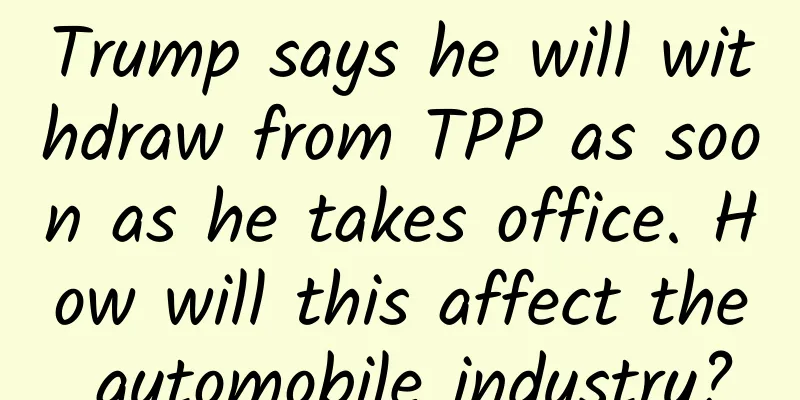Trump says he will withdraw from TPP as soon as he takes office. How will this affect the automobile industry?

|
On November 21, US time, Trump explained his 100-day governance plan through a video. In the video, he said that he would issue a presidential executive order on the first day of his presidency to withdraw from the Trans-Pacific Partnership Agreement (TPP). The history of TPP can be traced back to the "Trans-Pacific Strategic Economic Partnership Agreement" (TPSEP) signed by Chile, New Zealand, Singapore and Brunei in July 2005. This agreement provides a reciprocal economic cooperation agreement in related fields such as trade, services, intellectual property trade and investment. Since there were four initial member countries, it is also called the "P4 Agreement". In 2008, with the United States' high-profile announcement of joining the negotiations of the P4 Agreement, and Peru, Vietnam and Australia followed closely, P4 was upgraded to P8, and the negotiations on the TPP Agreement were officially launched on March 15, 2010. Since then, with the participation of Canada, Mexico, Japan and other countries, P4 quickly expanded to P12, so there are 12 member countries participating in the TPP framework agreement, namely: the United States, Japan, Canada, Australia, Singapore, Brunei, Chile, Malaysia, Mexico, New Zealand, Peru and Vietnam. The TPP was previously led by the United States and a basic agreement was reached on October 5, 2015. In the previous TPP basic agreement, since the negotiation framework of the TPP was mainly driven by multinational corporations in developed countries, as well as law firms and politicians serving these companies, the main interests focused on in the negotiations were: 1. It is convenient for multinational corporations to effectively utilize cheap labor and raw materials in developing countries; 2. It is convenient for multinational companies to effectively occupy the market; 3. It is convenient for multinational companies to obtain all the preferential policies of the countries where they are located under the TPP framework agreement; 4. Countries under the TPP framework agreement cannot exercise judicial jurisdiction over multinational corporations. Once a multinational corporation has a legal dispute with a country or regional government under the TPP framework agreement, it will not be heard by the host country's judicial body, but will be arbitrated by the ISDS (Investor-State Dispute Settlement Mechanism, hereinafter referred to as ISDS) located in New York. The arbitration result will be the final result. What does this mean? This means that the participating countries under the TPP framework agreement must cede part of their national sovereignty (especially jurisdiction). The TPP framework agreement does not serve any government, but serves the interests of the multinational companies behind the TPP agreement negotiations. From a long-term perspective, the TPP will eliminate tariffs on more than 10,000 products, including automobiles, agricultural products, chemicals and consumer goods, and achieve zero tariffs on intra-regional trade. However, due to the different economic development levels and industrial structures of the 12 participating countries, the impact of zero tariffs on their domestic economies and industrial development is different. In the previous negotiations on the TPP framework agreement, the automobile industry was an important area involved in the TPP negotiations. Before the 2008 financial crisis, the US government focused its economic focus on the financial speculation field of "money making money", resulting in the hollowing out of the US real economy led by manufacturing, which made Japanese automobile companies with stronger manufacturing technology accumulation, more stable quality and higher cost performance stand out in the US market. In the 2015 US auto sales ranking, Japanese cars occupied 7 seats. Therefore, the Japanese auto industry cheered the conclusion of the TPP agreement, while the American auto industry, which is relatively weak in market competitiveness, was extremely depressed. Not only did Detroit curse, but many American congressmen also expressed concerns: Japan's currency manipulation was not included in the TPP agenda, which means that Japanese cars will continue to have a price advantage in the United States. In addition to the auto industry, American manufacturing companies generally have a negative attitude towards TPP. In contrast, the American financial industry, represented by Wall Street, which pursues the free flow of capital, generally welcomes and actively promotes TPP. Because of his opposition to the globalization strategy actively promoted by the American elite, Trump has repeatedly stated during his campaign that he will abolish the TPP and take back American jobs if elected. Therefore, I believe that Trump's announcement that he will withdraw the United States from the TPP agreement after taking office means that the US government will adopt a more obvious local protectionist policy for local manufacturing companies, including the automotive industry. In the future, foreign automobile companies may face more trade lawsuits and even sanctions in the United States. Similar incidents to Toyota's "brake gate" in 2008 and Volkswagen's "emissions gate" in 2015 are likely to increase in the United States. From the perspective of China's automobile industry, the number of automobiles exported by Chinese vehicle manufacturers to the United States is very small and almost negligible, so the impact on Chinese vehicle manufacturers is not great; but from the perspective of the auto parts industry, Mr. Wang Xia, Chairman of the Automotive Industry Committee of the China Council for the Promotion of International Trade, once said: "In 2014, China's auto parts exports to the United States reached 11.5 billion US dollars, more than doubled from 2010." - If you want to accuse someone, you can always find a pretext. Faced with the rising trend of local protectionism in the United States, Chinese supporting parts companies may face more lawsuits when exporting to the United States in the future. Chinese supporting parts companies should pay special attention to preventing possible legal risks when exporting to the United States. As a winner of Toutiao's Qingyun Plan and Baijiahao's Bai+ Plan, the 2019 Baidu Digital Author of the Year, the Baijiahao's Most Popular Author in the Technology Field, the 2019 Sogou Technology and Culture Author, and the 2021 Baijiahao Quarterly Influential Creator, he has won many awards, including the 2013 Sohu Best Industry Media Person, the 2015 China New Media Entrepreneurship Competition Beijing Third Place, the 2015 Guangmang Experience Award, the 2015 China New Media Entrepreneurship Competition Finals Third Place, and the 2018 Baidu Dynamic Annual Powerful Celebrity. |
<<: Spy photos of the suspected new generation Giulietta will be released before 2020
>>: The big guy wants to "lose weight" Lincoln's new Navigator latest news
Recommend
Two common "intuitive interference factors" when making marketing plans
Have you ever had such doubts: "I have maste...
Let’s go and knit a sweater for the penguin!
Some time ago, a netizen @Michelangelo posted a m...
The stock market surge explains the wave theory in detail
Stock market surge detailed explanation of wave t...
Ruipu Lanjun released a series of big moves at the IAA! The Wending family products, European development strategy, and ESG carbon neutrality route were all launched
The full matrix Wending family series of products...
The secret of how Douyin influencers sold goods worth 130 million in 6 months!
Why are short videos so popular? What is the real...
Stop hoarding food! Someone has already gotten into trouble!
This article was reviewed by Pa Li Ze, chief phys...
Marketing promotion: 5 steps to implement gamification marketing!
In the era of information explosion, if you want ...
Learn sales management from Huawei
Learn sales management from Huawei Resource Intro...
During product iteration, how to use data to drive user growth?
In product iteration aimed at user growth , "...
Can this "hyped-up" probiotic really treat allergic rhinitis? Listen to what the doctor says →
gossip "There are probiotics specifically fo...
This festival-exclusive symbol of "red and green" has its origins in China?
Even if you have never paid much attention, you m...
State determines view - thinking about front-end development based on state
In today's front-end community, concepts such...
These high-value, high-priced "IQ fruits" are out to deceive people again. What are they? Don't buy them anymore!
During the May Day holiday, when you happily go t...
Apple's new patent: Self-driving cars can monitor passengers' emotions and adjust driving methods
According to foreign media reports, Apple's s...
A tough cat personal brand value-added notes knowledge planet
Introduction to the Knowledge Planet resource of ...









